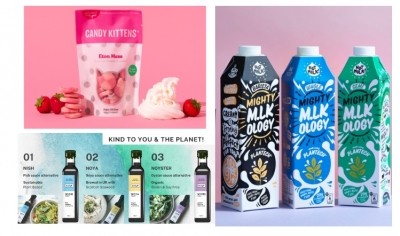Legal opinion
Plant-based food labelling: what the law says

Demand for vegan and plant-based foods is rising and so is the choice - it’s expected that meat-free food sales will reach £1.1bn in the next three years. With the trend showing no sign of slowing, more manufacturers are now considering introducing vegan and plant-based products in response.
From Beyond Meat and Impossible, to mainstream brands such as Nestlé looking at vegan ‘shrimp’ and ‘egg’, and Cadbury looking at a vegan version of the Dairy Milk bar, there's a lot of resource aimed at this expanding area.
The Vegan Society registered 14,262 new vegan products in 2019, up by almost 50% from the year before.
Consumers are embracing this approach to food, and it rides on the back of a number of concerns regarding sustainability, ethics, perceived health benefits and environmental issues. The Dimbleby report, which will help inform the National Food Strategy advocates consumption of more fruit and vegetables, among other points.
Vegan and plant-based: what’s the difference?
The term ‘vegan’ refers to those who aim to eliminate meat and dairy from their diets, but also those who exclude any product (whether it’s food or footwear) from their life if it has contributed to animal cruelty or exploitation.
‘Plant-based’ tends to refer to diets comprising of foods derived from plant sources such as fruits, vegetables, legumes and nuts – whether for ethical reasons or in pursuit of the perceived health benefits of this way of eating.
They are different in their scope and appeal to consumers who all have their own position on the broad spectrum of vegan and plant-based diets.
This is of course totally ignoring cultured meat and the use of insects as protein sources – an area that will likely require its own descriptions and vocabulary.
Join the market
All food needs to comply with the legislation in which the product is intended to be marketed and that is regardless of the source of the food.
At one end of this market we have innovators who are producing via microbial fermentation using fungi, yeasts, bacteria and other micro-organisms, instead of animals, to those who are replacing the ‘meat’ element with a plant protein.
New processes and techniques — and indeed new sources of ingredients — may mean the food is ‘novel’ and must seek approval through the novel food process for the EU and now for the UK too.
Some of this ‘novelness’ may not sit readily with consumer perceptions of ‘vegan’ or ‘plant based’ as being an ethical or ‘healthy’ option. What if the ingredients are derived from soy? Or genetically modified elements are used in the process?
Product information
Assuming the novel foods regulatory hurdles have been passed, the product must be safe, as per any typical food. It needs to be clearly marketed to sell and give the consumer sufficient information to make an informed choice.
Inaccurate or misleading label claims can attract challenge and also undermine the success of a brand.
Many foods have a reserved description that must be used if the product meets specific requirements or if there are compositional standards associated with a food. When a consumer has bought a food with a particular name on it and has come to expect a specific product for the last 30 years or more, the name is now customary and any deviation from the expectation needs to be made clear.
Naming products
Naming products or ingredients can be a minefield for those unused to the legislation. Reserved descriptions must be used and any deviation from consumer expectation needs to be made clear. For example, regulations state you must indicate what a product is, not what it isn’t (so ‘no chick’n’ or ‘XX – meat alternative’ would not be compliant if used as the name of the food).
Dairy terms — milk, cheese, butter, and yogurt — are protected and must only refer to products derived from animals (with some exceptions e.g. butterbeans, peanut butter, custard creams). This has been reinforced recently and we now see phrasing like 'soya drink' or 'almond fermented specialty with raspberries' and 'food slices made with coconut oil'.
Meat terms don’t have the same high level of legislative protections, although there have been moves to try and afford those protections both in the EU and in the US.
Using the word ‘alternative’ can indicate what the product is intended to be and its purpose to help the consumer to make an informed choice, but this may conflict with the restrictions on the use of dairy terms. For example, ‘milk’ in ‘milk alternative’ may not be compliant, however, 'a great alternative to milk when baking a cake' may be positively encouraged.
Historical precedent
In spite of all of this, the UK has a long history of naming products that are perhaps not as expected. On first look, ‘Vegetable Lard’ was found to be acceptable in 1987 and was not misleading. We’ve consumed Turkey Ham and Turkey Bacon for such a long time that it’s become accepted (although ham is the cured hind quarter of a pig and bacon is from the back, belly or sides), along with 'I can’t believe it’s not butter'.
It's important to consider the technical requirements of legislation, but it's most important to avoid misleading the consumer and to ensure they have sufficient information with which to make an informed decision. Describing the use of the food allows the consumer to understand how to use it – ‘use as an alternative to…’.
It could be argued that current legislation requires this descriptive information to appear in proximity to the name of the food so that consumers may know the true nature of the food.
It's important to consider potential risk of cross-contamination from animal products too — potential animal sources of additives and ingredients are not always apparent. Many meat-free production facilities will actually look to stop staff members bringing in lunch containing meat to reduce any risk of cross-contamination.
Health Claims
‘Plant-based’ isn’t a synonym for ‘healthy’ and food manufacturers should be wary of making bold claims about the health benefits of their products. Controls on nutrition and health claims must still be observed. Also the presence of substantially more legumes in the diet may in itself be an issue with some data indicating that allergic reactions to these ingredients could be increasing as a result of more consumers being exposed to these ingredients.
Future-proofing
There is currently no legal definition of what a vegan product is in the UK or EU, and even the smallest of details — such as the use of natural flavourings, or the type of glue used on labels — can impact some consumers’ decisions.
Many organisations have their own definition of vegan and procedures for ensuring compliance, with some conducting thorough audits regularly to make sure the process continues to meet their definition. Consumers need to be aware of the differing definitions and what they might mean to their personal take on the vegan or plant-based lifestyle.
However, the Food Information Regulation, which covers the EU and the UK has a provision allowing the EU to add further definitions as required. There is now an ISO standard relating to the definitions and technical criteria for vegan and vegetarian goods. Regulators are turning their attention to the market also, in a bid to protect consumers and to ensure a level playing field.
Expert Advice
Be aware of the technical requirements for your intended product, from conception to marketing. It must be safe. Product information must be delivered correctly and observe specific requirements like dairy and compositional standards that impinge on names, but the overall presentation of food information must not mislead.
At one time, replacing meat with plant-based material was subject to legal action but now it is positively promoted – as long as it does not mislead.
Pete Martin is regulatory director at product information specialist Ashbury.


















